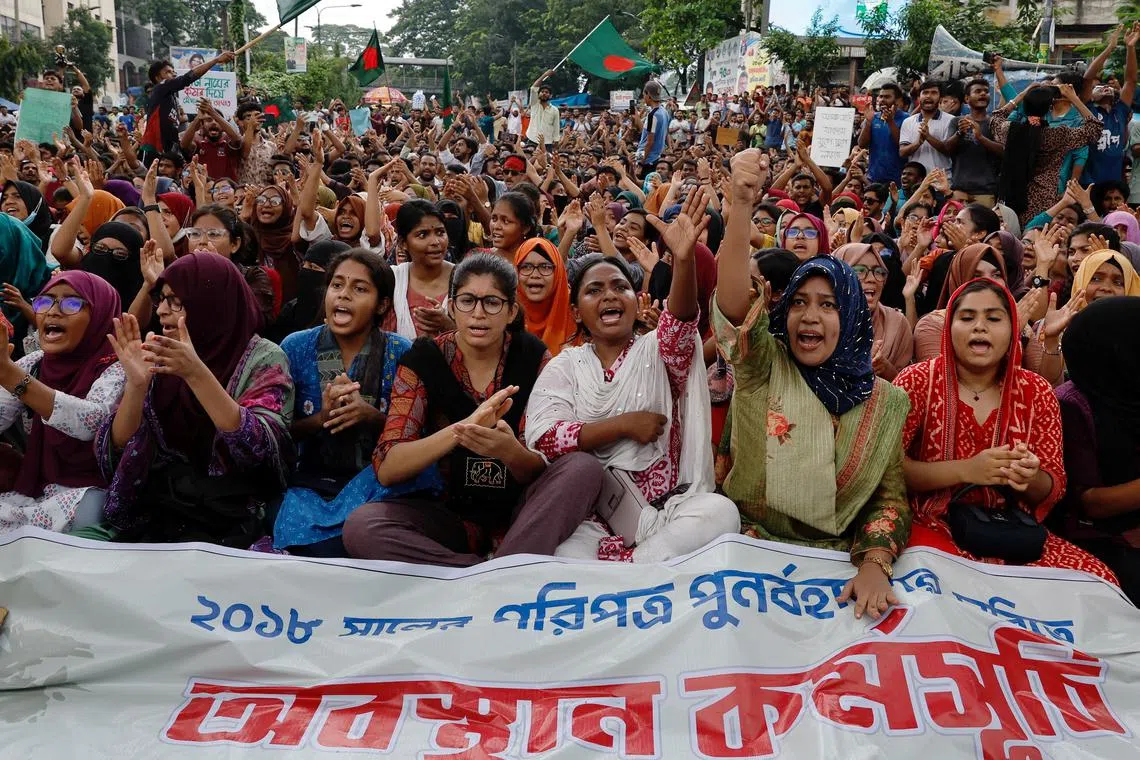At least 5 killed in Bangladesh job quota protests
Sign up now: Get insights on Asia's fast-moving developments

Students and job seekers protesting against a quota system for government jobs.
PHOTO: REUTERS
DHAKA – At least five demonstrators were killed in Bangladesh on July 16 during violent clashes between rival student groups over quotas for coveted government jobs, police said, a day after more than 100 others were injured.
Police fired tear gas and rubber bullets, as students demanding that quotas be cut battled with counter-protesters backing the ruling Awami League party, fighting with sticks and hurling rocks. Reuters reported that a university student was killed on July 16.
The violence is an escalation in efforts to hinder a determined campaign that has ignored calls by Bangladesh’s prime minister and top court for the students to return to class.
Students have for weeks staged near-daily protests demanding the government introduce a merit-based scheme instead.
Critics say the current system benefits children of pro-government groups that back Prime Minister Sheikh Hasina, 76, who won her fourth consecutive election in January after a vote without genuine opposition.
In the first significant demonstrations against her government since January, protests have erupted against quotas for jobs, including a 30 per cent reservation in jobs for descendants of freedom fighters from the 1971 War of Independence.
Stagnant job growth in Bangladesh’s private sector has made government jobs, which offer regular wage hikes and other privileges, more attractive, said Dr Mohammad Abdur Razzaque, chairman of Research and Policy Integration for Development.
In Bangladesh, 56 per cent of government jobs are reserved for various quotas. Women have a 10 per cent reservation, 10 per cent are for people from underdeveloped districts, 5 per cent for indigenous communities and 1 per cent for people with disabilities.
Violence erupted on July 15 when thousands of anti-quota protesters clashed with members of the student wing of Ms Hasina’s Awami League party.
Protesters have planned more marches and rallies nationwide and demonstrations will continue until their demands are met, said Mr Nahid Islam, coordinator of the anti-quota protests.
Sporadic violence was reported on July 16, with students blocking railways and major highways. TV footage showed heavy presence of police, wearing protective vests and helmets and armed with wooden sticks, outside the Dhaka University campus.
The student wing of the main opposition Bangladesh Nationalist Party also called for marches on July 17 to demonstrate against the July 15 attack on protesting students.
Protests began earlier in July when the Supreme Court ordered the government to reinstate the 30 per cent job quota.
It suspended the order last week for a month, but protests continued, and they intensified after Ms Hasina refused to meet the students’ demands, citing ongoing court proceedings.
Ms Hasina labelled those opposing the quota as “razakar” – a term used for those who allegedly collaborated with the Pakistani army during the 1971 war – prompting more widespread protests.
Despite manufacturing production having grown by an average of 10 per cent annually since 2011, employment in the sector has fallen between 2017 and 2023, Dr Razzaque said, citing official statistics.
“Additionally, youth unemployment is high, with nearly 32 million young people not in education, employment, or training,” he added. REUTERS, AFP


